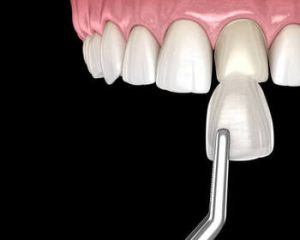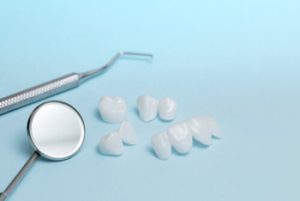In the pursuit of a radiant and confident smile, dental veneers often emerge as a popular cosmetic dental treatment, praised for their transformative results. However, veneers are not the only path to achieving the smile of your dreams. The world of cosmetic dentistry offers more than one alternative to veneers. Whether you seek a less invasive option, are concerned about preserving your natural tooth structure, or wish to explore all possible avenues, understanding the full spectrum of available treatments is essential.
This comprehensive guide delves into the alternatives to veneers, highlighting treatments such as teeth whitening, dental crowns, inlays and onlays, and clear aligners. We will examine why porcelain veneers remain optimal for many despite the myriad options. On top of that, we will discuss what to anticipate during the porcelain veneer procedure and how to care for your enhanced smile.
By the end of this article, you will clearly understand the various cosmetic dental treatments available, empowering you to make an informed decision that best suits your unique dental needs and aesthetic goals.
What Are Dental Veneers?
Dental veneers are custom-made, tooth-coloured shells covering the teeth’s front surface. They are typically made from porcelain and enhance the overall appearance of teeth by addressing issues such as discolouration, chipped teeth, misshapen teeth, and minor misalignments.
Reasons You May Become Ineligible For Veneers
While veneers can dramatically improve appearance, they may not be suitable for some people. Understanding how these factors may affect eligibility can help you make informed decisions.
- Severe Tooth Decay: Extensive decay may require restorative treatments before veneers are considered.
- Gum Disease: Active gum disease should be controlled first because it can lead to receding gums.
- Insufficient Tooth Structure: Teeth that are severely damaged or worn down may not provide a stable veneer base.
- Bruxism (Teeth Grinding): Habitual grinding or clenching can damage veneers and may require alternative treatments.
Alternatives To Veneers
Exploring alternative treatments can offer various solutions if you’re considering ways to enhance your smile but find that veneers may not be the right fit. Each alternative addresses dental concerns, from discolouration and damage to alignment issues. Understanding these options may help you choose the best possible approach based on your unique needs and goals.
Tooth Whitening
If you’re looking to improve the appearance of your smile without altering tooth structure, teeth-whitening treatments offer a non-invasive option.
Teeth-whitening treatments (whether in the office or at home) aim to brighten the colour of your teeth by using bleaching agents to reduce or remove stains and discolouration. These treatments can vary in strength and application methods, offering flexibility based on your specific needs and preferences.
Dental Crowns
Dental crowns are caps that encompass the entire surface of a damaged or weakened tooth. They restore the tooth’s shape, size, and strength, making them an effective solution for significant damage or decay.
Inlays And Onlays
Inlays and onlays are restorative treatments utilised to repair damaged or decayed teeth. Unlike crowns covering the entire tooth, inlays and onlays are custom-made to fit within specific areas of the tooth. They are made from durable materials such as porcelain or composite resin and are customised to fit the tooth cavity.
Clear Aligners
Clear aligners are removable, custom-made trays made from transparent plastic. They gradually move your teeth into the desired position through a series of aligners, making them a popular choice for those seeking a less noticeable orthodontic treatment.
Signs You Need Dental Veneers
Understanding the signs that indicate you might benefit from veneers can help you make an informed decision about your dental care.
Here are some common signs that you might need veneers:
- Chipped Teeth: Veneers can restore the shape and appearance of teeth that are chipped or damaged.
- Discoloured Teeth: If you want teeth resistant to discolouration, veneers can provide a consistent, bright appearance.
- Misshapen Or Crooked Teeth: Veneers can correct irregularities in tooth shape, giving you a more uniform smile.
- Uneven Teeth: If your natural teeth are uneven or have gaps, veneers can improve the overall symmetry of your smile.
- Minor Misalignments: Veneers can address minor crookedness or gaps without the need for orthodontic treatment.
Why Porcelain Veneers Are An Optimal Option
Porcelain veneers have emerged as a prominent choice in cosmetic dentistry, admired for their ability to transform smiles with natural beauty and resilience. Understanding the multitude of benefits they offer can help you decide if they are the right option for your smile makeover.
Natural Appearance
One of the most compelling reasons to choose porcelain veneers is their unparalleled natural appearance. Porcelain has a unique translucency that closely mimics the light-reflecting properties of natural tooth enamel.
This means that porcelain veneers can seamlessly blend with your existing teeth, ensuring your smile looks both stunning and authentic.
The customisation process allows for precise matching of the colour, shape, and size of each veneer to your natural teeth, enhancing the overall harmony of your smile.
Stain Resistance
Unlike natural tooth enamel, which may be prone to discolouration from foods, beverages, and smoking, porcelain maintains its pristine appearance over time.
This stain resistance ensures that your veneers will continue to look vibrant and fresh with minimal maintenance, preserving the aesthetic appeal of your smile for years to come.
Durability
Durability is another significant advantage of porcelain veneers. When properly cared for, porcelain veneers are incredibly robust and can last many years, providing a long-lasting solution for smile enhancement.
The strength of porcelain helps protect your natural teeth from further wear and damage, ensuring that your veneers remain intact and functional. This durability makes porcelain veneers an excellent investment in your dental health and overall appearance.
Preservation Of Natural Tooth Structure
One of the fundamental benefits of porcelain veneers is their ability to preserve more of your natural tooth structure than other cosmetic dental treatments. The preparation process for veneers typically involves minimal enamel removal, which helps maintain the integrity of your natural teeth.
This conservative approach not only supports the health of your teeth but also enhances the longevity of the veneers themselves.
Customisation And Precision
Porcelain veneers are crafted with a high degree of customisation and precision. Dental experts use advanced technology and techniques to design veneers that fit perfectly over your teeth, ensuring a comfortable and secure fit.
This customisation process involves taking detailed impressions of your teeth and creating veneers that are tailored to your specific needs and preferences. The result is a set of veneers that look and feel natural, providing a flawless smile makeover.
Comfort And Functionality
Beyond their aesthetic benefits, porcelain veneers also offer improved comfort and functionality. They can correct several dental issues, such as chipped, cracked, or misaligned teeth, enhancing both the appearance and function of your teeth.
Veneers can also strengthen weakened teeth, making them less susceptible to further damage. This dual benefit of aesthetic improvement and functional enhancement makes porcelain veneers a comprehensive solution for many dental concerns.
Biocompatibility
Porcelain veneers are biocompatible, meaning they are well-tolerated by the surrounding gum tissue and unlikely to cause adverse reactions.
This compatibility ensures that your gums remain healthy and unharmed by irritation, contributing to the overall success of the veneer placement. The biocompatible nature of porcelain also supports long-term oral health, making veneers a safe and effective option for many patients.
Boost In Confidence
One of the most notable advantages of porcelain veneers is the boost in self-esteem they can provide. A beautiful smile can profoundly impact your self-esteem and overall quality of life.
Porcelain veneers can help you enjoy a smile you are proud to show off, enhancing your confidence in social and professional settings. This improvement in self-assurance can lead to a more positive outlook and greater opportunities in various aspects of your life.
Minimal Maintenance
Maintaining porcelain veneers is relatively simple and requires no special care beyond your regular oral hygiene routine.
Brushing twice daily, flossing, and dental check-ups are sufficient to keep your veneers in excellent condition. This ease of maintenance ensures you can enjoy the benefits of your enhanced smile without significant additional effort.
Versatility
Porcelain veneers are versatile and can tackle various cosmetic dental issues.
Whether you are dealing with discolouration, gaps, minor misalignments, or damaged teeth, veneers can provide a comprehensive solution. This versatility makes them suitable for many patients seeking to take the appearance of their smiles to the next level.
The Step-By-Step Process For Your Porcelain Veneers Procedure
Embarking on the journey to achieve a radiant smile with porcelain veneers is an outstanding and transformative experience. The procedure is meticulously designed to ensure optimal results and patient satisfaction.
Here is a detailed overview of what you can expect during the porcelain veneer procedure:
Initial Consultation
The first step in the process is a comprehensive consultation with your dental expert. During this visit, your dentist will look into your dental health through a thorough examination to confirm that you are a suitable candidate for veneers. This includes inspecting the condition of your teeth, gums, and overall dental structure.
Understanding your aesthetic goals is crucial; your dentist will discuss what you hope to achieve with veneers, whether it’s correcting discolouration, closing gaps, or improving the shape and alignment of your natural teeth.
Based on the evaluation and your goals, your dental expert will determine if porcelain veneers are the best option for you. If they are not suitable, dental veneer alternatives may be discussed.
Preparation
The preparation phase begins once you and your dental professional have decided to proceed with porcelain veneers. This entails several key steps to ensure the best possible outcome.
First, a precise amount of enamel is removed from the front surface of your teeth. This step is crucial to creating space for the veneers and ensuring they sit flush with your natural teeth, providing a seamless appearance.
Typically, only a thin layer is removed. To ensure your comfort during the removal process, local anaesthesia may be administered, numbing the area and minimising any potential discomfort.
Impressions
After the enamel has been prepared, your dentist will take detailed impressions of your teeth. These precise impressions serve as a blueprint for creating your customised veneers.
Dental impression material is used to create accurate moulds of your prepared teeth, capturing their unique contours and dimensions.
Choosing the right shade for your veneers is essential for achieving a natural look, so your dental expert will help you select a shade that matches or enhances the colour of your existing teeth.
Temporary Veneers
While your permanent veneers are being created in an advanced dental laboratory, temporary veneers may be placed to safeguard your prepared teeth and maintain your appearance.
Temporary veneers safeguard your teeth from sensitivity and damage while providing a preview of your new smile.
These temporary restorations allow you to maintain normal oral functions, such as eating and speaking comfortably, during the interim period.
Fitting And Adjustment
Once your custom-made porcelain veneers are ready for placement, you will return to the dental office for the fitting and adjustment phase. This step is critical for ensuring your veneers fit perfectly and look natural.
Your dentist will initially place the veneers on your teeth without permanent bonding to assess their fit, colour, and overall appearance. Any necessary adjustments will be made to ensure optimal results. After achieving the perfect fit, the veneers are permanently bonded to your teeth using a strong dental adhesive.
The bonding process involves several steps: your teeth are cleaned and etched to create a suitable surface for the adhesive; a customised dental adhesive is applied to the porcelain veneers, and they are carefully positioned on your teeth; a curing light is then used to harden the adhesive, securely attaching the veneers to your teeth.
After the veneers are bonded, your dental professional may make final modifications to ensure your bite is not irritated and the veneers are perfectly aligned.
Post-Procedure Care
Following the fitting and adjustment of your veneers, your dentist will provide you with detailed care instructions to maintain your new smile. Maintaining excellent oral hygiene is essential for the longevity of your veneers.
Your dentist will schedule follow-up appointments when necessary to monitor the condition of your veneers and ensure they are functioning well.
These visits are also an opportunity to address any questions or concerns. Certain habits, such as biting hard objects or grinding your teeth, should be avoided to prevent veneer damage. Your dentist may recommend a night guard if you are prone to teeth grinding.
The porcelain veneer procedure is a carefully orchestrated process that combines artistry and precision to deliver a stunning, natural-looking smile. By understanding each step and following your dentist’s recommendations, you can enjoy the transformative benefits of porcelain veneers and maintain a beautiful, healthy smile for years.
Frequently Asked Questions
Are there any risks associated with dental veneers?
While veneers are generally safe, potential risks include sensitivity, damage from grinding, or issues with bonding. Consulting with a dental professional can help mitigate these risks.
How long do porcelain veneers last?
With proper care, porcelain veneers can last between 10 and 15 years. Regular dental check-ups and good oral hygiene are crucial for their longevity.
What should I do if my veneers are damaged?
If your veneers are damaged, contact a dental professional for advice. Depending on the extent of the damage, they may recommend repair or replacement.
Final Thoughts On Achieving Your Perfect Smile
When embarking on the journey to enhance your smile, it is paramount to consider all available alternatives to veneers to make a well-informed decision. Teeth-whitening treatments, dental crowns, inlays and onlays, and clear aligners each offer unique benefits and effectively address specific dental concerns.
- Remarkable ability to emulate tooth enamel’s natural.
- Translucency and hue
- Incredible durability
- Minimal invasiveness concerning natural tooth structure.
Porcelain veneers provide a comprehensive solution that significantly enhances the aesthetics of your smile and reinforces the overall functionality and strength of your teeth.
While other treatments offer notable improvements, porcelain veneers are especially well-suited for those seeking a profound and enduring smile transformation. The versatility and customisation inherent in porcelain veneers make them an exemplary option for addressing dental imperfections.
Ultimately, the choice should be guided by your unique needs, aesthetic aspirations, and the expert advice of your dental care provider. By thoroughly considering the myriad benefits of porcelain veneers alongside other viable alternatives, you can make an enlightened decision and confidently choose the best path to achieving the radiant smile of your dreams.
Ready to discover which treatment is the perfect fit for your smile? Contact Casey Dentists, located in Aitkenvale (Townsville), today at 07 4801 7035 to explore your options towards the ideal cosmetic dental procedure for achieving your dream smile.
Sources:
Baluch, Anna. “How Long Do Veneers Last? What to Expect.” Forbes Health, 10 Apr. 2024, www.forbes.com/health/dental/how-long-do-veneers-last. Accessed 19 July 2024.
Beck, Robert. “Dental Veneers.” WebMD, 7 Sept. 2023, www.webmd.com/oral-health/veneers. Accessed 19 July 2024.
Colgate. “Will a Gum Veneer Help Your Receding Gums?” Colgate®, 9 Jan. 2023, www.colgate.com/en-us/oral-health/veneers/will-a-gum-veneer-help-your-receding-gums. Accessed 19 July 2024.
Crest. “Top 20 Reasons Why Teeth Get Stained.” Crest, crest.com/en-us/oral-care-tips/teeth-stains/top-20-reasons-why-teeth-get-stained. Accessed 19 July 2024.
“Dental Veneers – What to Expect.” Oral-B, oralb.com/en-us/oral-health/life-stages/adults/dental-veneers-what-to-expect. Accessed 19 July 2024.
Watson, Shawn. “Dental Crown: Types, Cost, and Procedure.” Verywell Health, 24 May 2023, www.verywellhealth.com/getting-a-dental-crown-1059036. Accessed 19 July 2024.



